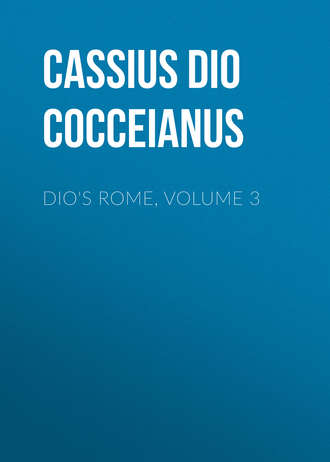
Dio's Rome, Volume 3
58
The gymnasiarch was an essentially Greek official, but might be found outside of Hellas in such cities as had come under Greek influence. In Athens he exercised complete supervision of the gymnasium, paying for training and incidentals, arranging the details of contests, and empowered to eject unsuitable persons from the enclosure. We have comparatively little information about his duties and general standing elsewhere, but probably they were nearly the same. The office was commonly an annual one.
Antony did not limit to Alexandria his performance of the functions of gymnasiarch. We read in Plutarch (Life of Antony, chapter 33) that at Athens on one occasion he laid aside the insignia of a Roman general to assume the purple mantle, white shoes, and the rods of this official; and in Strabo (XIV, 5, 14) that he promised the people of Tarsos to preside in a similar manner at some of their games, but the time came sent a representative instead.—See Krause, Gymnnastik und Agonistik der Hellenen, page 196.
59
See Book Forty-eight, chapter 35.
60
Chapter 4 of this book.
61
Cp. Book Forty-seven, chapter 11.
62
Sc. of denarii.
63
L. Tarius Rufus.
64
Dio in some unknown manner has at this point evidently made a very striking mistake. Sosius was not killed in the encounter but survived to be pardoned by Octavius after the latter's victory. And our historian, who here says he perished, speaks in the next book (chapter 2) of the amnesty accorded.
65
Canopus was only fifteen miles distant from Alexandria (hence its pertinence here) and was noted for its many festivals and bad morals,—the latter being superinduced by the presence in the city of a large floating population of foreigners and sailors. The atmosphere of the town (to compare small things with great) was, in a word, that of Corinth.
66
The cordax was a dance peculiar to Greek comedy and of an appropriately licentious character, resembling in some points certain of the Oriental dances that survive to the present day.
67
Nicopolis, i. e., "City of Victory." The same name was given by Pompey to a town founded after his defeat of Mithridates. (See Book Thirty-six, chapter 50.)
68
An allusion to the second of the two taxes mentioned in Book Fifty, chapter 10.
69
Verb supplied by R. Stephanus.
70
Cobet's interpretation (Mnemosyne X (N.S.), 1882).
71
Compare Pliny, Natural History, XXI, 78.
72
There is an ambiguous [Greek: aùrtuv] here. Only Boissée, however, takes it to mean the Romans. Leonieenus, Sturz and Wagner translate is as "Alexandrians."
73
A reminiscence of the Eumenides of Aischylos.
74
See Glossary (last volume) and also compare the beginning of chapter 24 in Book Thirty-seven.
75
Latin "vexillum caeruleum,"—a kind of flag or banner.
76
The custom was that the magistrates should issue from the town to meet the triumphator and then march ahead of him. Octavius by putting them behind him symbolized his position as chief citizen of the State.
77
These buildings are mentioned together also in the Monumentum Ancyranum (C:L., 1T:, part 2, pp. 780-781).
78
The name of this river is also spelled Cebrus.

